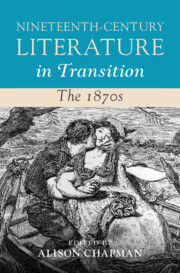Book contents
- Nineteenth-Century Literature in Transition: The 1870s
- Nineteenth-Century Literature In Transition
- Nineteenth-Century Literature in Transition: The 1870s
- Copyright page
- Contents
- Figures
- Contributors
- Acknowledgements
- Introduction
- Chapter 1 The 1870s and the Invention of Victorian Literature
- Chapter 2 Media Technologies, the Organisation of Knowledge, and 1870s Literary Culture
- Chapter 3 Assembling the 1870s
- Chapter 4 Feminism, Reform, and the Professional Woman Writer in the 1870s
- Chapter 5 The ‘High Victorian’
- Chapter 6 Middlemarch, High Realism, and the Victorian Everyday
- Chapter 7 The Post-sensational Seventies
- Chapter 8 The Shock of Aestheticism
- Chapter 9 ‘Verses, Good and Bad’
- Chapter 10 The Comings and Goings of High Victorian Nonsense
- Chapter 11 Transforming Pages
- Chapter 12 Literature, Science, and the Voice of the 1870s
- Chapter 13 A ‘sweet especial rural scene’? Nature, Culture, and Agriculture in the 1870s
- Bibliography
- Index
Chapter 2 - Media Technologies, the Organisation of Knowledge, and 1870s Literary Culture
Published online by Cambridge University Press: 30 January 2025
- Nineteenth-Century Literature in Transition: The 1870s
- Nineteenth-Century Literature In Transition
- Nineteenth-Century Literature in Transition: The 1870s
- Copyright page
- Contents
- Figures
- Contributors
- Acknowledgements
- Introduction
- Chapter 1 The 1870s and the Invention of Victorian Literature
- Chapter 2 Media Technologies, the Organisation of Knowledge, and 1870s Literary Culture
- Chapter 3 Assembling the 1870s
- Chapter 4 Feminism, Reform, and the Professional Woman Writer in the 1870s
- Chapter 5 The ‘High Victorian’
- Chapter 6 Middlemarch, High Realism, and the Victorian Everyday
- Chapter 7 The Post-sensational Seventies
- Chapter 8 The Shock of Aestheticism
- Chapter 9 ‘Verses, Good and Bad’
- Chapter 10 The Comings and Goings of High Victorian Nonsense
- Chapter 11 Transforming Pages
- Chapter 12 Literature, Science, and the Voice of the 1870s
- Chapter 13 A ‘sweet especial rural scene’? Nature, Culture, and Agriculture in the 1870s
- Bibliography
- Index
Summary
Taking the nationalisation of the telegraph in 1870 as a starting point, this chapter considers how information was understood as immaterial yet depended upon a complex material infrastructure. The first section addresses telegraphy as a technology of the present, enabling people to experience new kinds of contemporaneity, while, at the same time, ensuring that it remained stubbornly uneven. The second turns to text, exploring how it was made suitable for transmission by new information technologies and the new kinds of workers employed to process it. The third looks at the print archive. To ensure the right information could be readily retrieved, systems of bibliographic control were developed to manage the material from which it derived. Throughout, I return to Anthony Trollope’s The Way We Live Now (1875). Trollope’s novel is deeply interested in the contemporary, attending to the technologies that structure the moment and those that make that moment pass.
Keywords
- Type
- Chapter
- Information
- Nineteenth-Century Literature in Transition: The 1870s , pp. 43 - 63Publisher: Cambridge University PressPrint publication year: 2025

